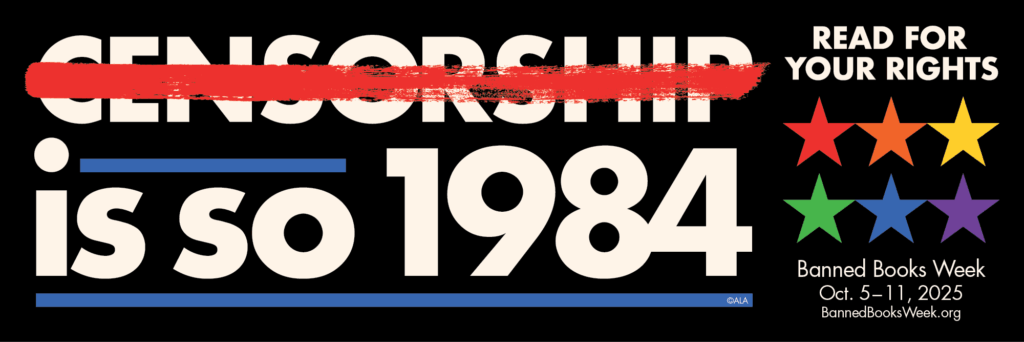This was originally written for the EPL to share during their Freedom to Read week event, this feels just as appropriate to share this week as it is Banned Books Week.

I struggled with how to approach this subject. I wasn’t sure how to talk about intellectual freedom apolitically in a world where books are increasingly challenged as a political weapon. And possibly even more importantly, whether I should even try.
Similarly, what did I have to say on the subject that would not be simply preaching to the choir? Because I think that most library users really and truly value intellectual freedom. They want to be able to read about what they want to read about. And the EPL also wants that – it is at the absolute heart of their mission statement. “EPL believes every individual has the right to both seek and receive information from all points of view without restriction….”
And then I realized that I was coming at this from the wrong direction. I was thinking about the ideas of intellectual freedom and censorship from the point of view of a reader. But I am not the EPL’s Reader in Residence, I am the EPL’s Writer in Residence.
And the Freedom to Read is also the Freedom to Write.
I probably don’t need to tell you this but writing is challenging – especially if you are writing for publication. It’s not just thinking up stories and putting them on the page (which is plenty hard enough), it’s also finding (or becoming) a publisher, finding (or creating) an audience. It’s about putting something that you’ve worked incredibly hard on out into the world and hoping that it will connect with people. It’s about competing for visibility against books written by other people and, these days, also those churned out by generative AI.
And it’s about the imaginary people who float just behind your shoulder…
Or, at least there are some just behind my shoulders.
Sometimes they are so quiet I don’t hear them and I’m able to just work, but sometimes they are there. The sharp voice from a teacher saying, “Why do you always write about this?” or the tooth sucking from someone I care about saying, “Must you use that word?”. Or completely imaginary people – composites of people saying, “You suck!” or “You could only imagine this sort of thing if you were a horrible person!”
I can usually ignore those voices and keep working because I know if someone doesn’t like my writing, the worst thing that will happen is probably just a bad review. But some writers are not so lucky. For them the consequences of offending the wrong reader are so much bigger.
The very best stories are the ones which are told honestly, and you can’t be honest as an author if you have to worry about offending people. Could I tell interesting, timely stories if I had to worry about being arrested or killed if the wrong person took offense to them? I don’t think I could. I don’t think I’d be brave enough.
The freedom to read is absolutely vital to our society and to me as an individual but so is the freedom to write. I am eternally grateful that the former is enshrined in the Universal Declaration of Human Rights and upheld by our libraries because that, in turn, protects the latter. And that means there are fewer imaginary people standing behind me while I write, which helps me inch just a little bit closer to the real honesty I continue to seek in my work.


I hear you, Sephera.
I remember sitting in front of a bookstore with a table full of my collected ghost stories and at least once an hour I had somebody walk up and say something like “Ooh, ghost stories. That’s far too scary for me. Don’t you write any nice books?”
Nice.
Real nice.
I still sell a fair amount of my ghost stories and my horror works, but I wish I had a dollar for every person I spoke with who told me how much they don’t like scary stories.
Go away, all of you wuss-bellied readers.
I’ve got some horror to write.